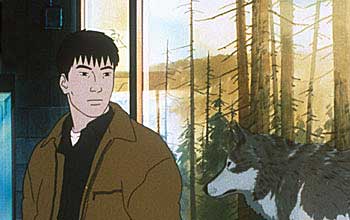|
So, you could very well think you're going to be on a show for a while, and then get wacked? MD: Yeah, I thought I was going to be on "Re-Boot" for a while. TY: But he was on "X-Files" about three or four times as different characters. He was a cop for about three times, and an ATF officer another time. Then he played a military soldier. So, Toshi is like your walking resume? MD: Yeah, Toshi's great. TY: You had a miserable death in "The Sentinel." MD: Yeah, I drowned in "The Sentinel." TY: You got to ogle Linda Carter's breasts in "Hawkeye." MD: Oh, yeah. That's right. TY: With a really dumb French accent. MD: She was just stunning. I couldn't believe how beautiful she was when I met her in real life. How did you get to be involved with "Jin-Roh?" TY: Well, we were going to hire Paul for the lead. But the creators in Japan thought he sounded too handsome. They needed someone more down-to-earth, and mumbly. MD: My brother, the nemesis. TY: No, we did our first round of casting and Paul was the only one to make it through. Then we did a secondary session and that's when Mike outshined Paul, who is the usual lead-getter, for this show.
When you first saw the film, what did you think of it in terms of how different it is in comparison to other anime titles? MD: It was a real incredible experience to do live action acting for an animation show. I was already a huge fan of the creators. "Ghost in the Shell" just floored me. I didn't think you could do that with animation. It was beautifully shot, the music was incredible, the characters were all strong and very interesting. And "Ghost in the Shell" worked on so many story levels -- a spiritual level, an action level, etc. I'm a very visual person and that's probably why I really connected with this particular piece of work. "Jin-Roh" is very visual; there is a lot of stillness. The director allows for action to play out completely, capturing whistling in the wind, blowing through the characters' hair. I love that kind of film making because it draws an audience in and it also gives the audience the credit that they're intelligent enough to interpret what's going on and escape without being hit over the head with exposition all the time. I love it when a film is able to immerse you in another reality. And for me, playing Fuse, I thought it was going to be a really cool experience to do that in animation as an actor -- to be able to feel and visualize what my character is doing and what's going on with him. He has so many things going on inside his head and he's a very quiet, very reserved person. I had a very narrow corridor of emotional range to work with. I had to really feel that pain in him, but I couldn't do it with broad strokes. I knew, in a sense, I had to be careful with him or else he would be just boring and monotone all the way through the film. It could have come across as very flat acting. Somewhere in there I knew the nuances had to play off. And to be able to do nuances in animation, it was a challenge. So the whole experience of doing "Jin-Roh" � well, let's just say I would have done it for nothing. What about the ambitious goals that Viz and Bandai have set for "Jin-Roh," getting the film a theatrical release and, possibly, a consideration for an Oscar? MD: I think that this style of anime, it would be great if it were able to garner a larger audience, to be able to show that animation has a place alongside live action films, to have a film that allows you to immerse yourself in the reality of an animated feature. And animation can be just as powerful as live action. "Jin-Roh" is currently in the middle of a nationwide screening tour. Check the official website for details. |
|||
|
Jin-Roh © Mamoru Oshii / Bandai Visual / Production I.G .
|

